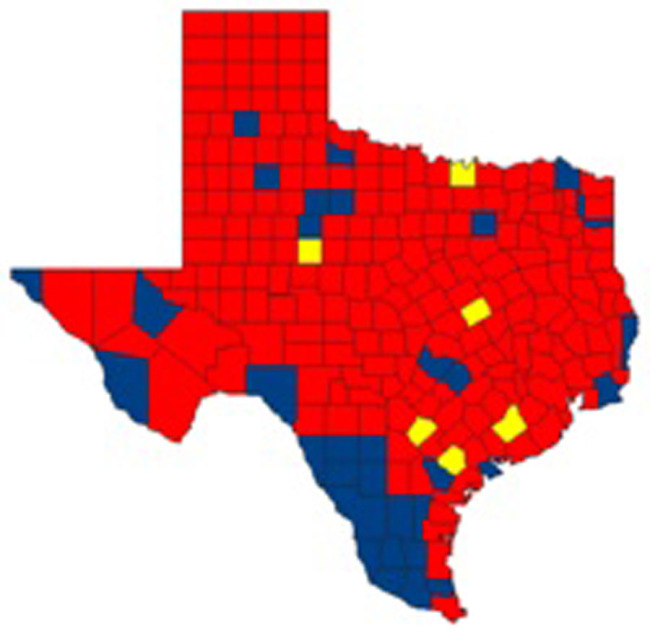
On Nov. 8, 1994, George W. Bush defeated incumbent Ann Richards in Texas’ gubernatorial election, ending an era in which Democrats controlled the governorship for nearly 120 years. Since 1994, there have been approximately 100 statewide political races held in Texas, and Republicans have won all of them. The current Democratic drought is the longest of any state in history, and the 2014 elections extended the winning streak for Republicans.
Despite being in a vastly Republican state, Dallas County has been primarily Democrat for almost 10 years.
“Dallas County started turning Democrat in 2006,” said Wade Emmert, chairman of the Dallas County Republican Party. “That was the midterm of President Bush’s second term. Historically, the party in office during a second term presidency does worse in national and local races. That was certainly the case in Dallas.”
Demographics
A contributing factor to Dallas being chiefly Democrat are the demographics. Today, Dallas is primarily Democrat due to the growing African American population that votes overwhelmingly Democrat.
“Dallas is a melting pot of cultures and races, and that’s why we see so many differing political views, compared to smaller towns in Texas of one overwhelmingly popular view,” said Mary Anna Billingsley, president of SMU College Republicans. “Even right here at SMU.”
African Americans have historically voted exceedingly Democrat in Texas, but what about Hispanics and other minority groups? Emmert thinks that the Democratic Party’s hold on minority groups is changing.
“Hispanics are voting more and more Republican, and less and less Democratic. In fact, in Texas, the Republican Party has elected more Hispanics to office than any other party,” he said.
Dallas has one of the largest concentrations of corporate headquarters for publically traded companies in the United States, which brings in waves of young professionals seeking the job opportunities that the Metroplex offers. Adam Stowe, New York native and recent college graduate, recently started working for a small hedge fund in Dallas.
“I am liberal on most economic and social issues and tend to always vote for the Democrat candidate. I would say that most of my young professional friends in Dallas would say the same,” Stowe said. “Even though I live in Texas, I don’t feel like I’m in the minority politically in Dallas.”
Straight Ticket Voting
Republicans and Democrats differ in the way that they vote, which also contributes to why Dallas is exceedingly Democrat.
“Dallas Democrats tend to vote overwhelmingly straight ticket, meaning they vote for every Democrat on the ballot, regardless,” said Cal Jillson, professor of political science at SMU. “They do so more than Republicans do, and helps them in down ballot races.”
Location Location Location
Currently, for the most part, liberal Democrats dominate the neighborhoods closer to downtown, as well as the city’s southern sector, while conservative Republicans dominate the wealthy suburban neighborhoods of North Dallas. As an expansion of suburban neighborhoods northward, Dallas’ northern half is considerably Republican dense. According to a study conducted by the Bay Area Center for Voting Research, after the 2004 presidential election, Plano, Dallas’ largest northern suburb, ranked as the fifth most conservative city in America.
“Dallas is losing conservatives to surrounding counties. Denton County and Collin County are two of the most conservative counties in the entire state. As conservatives continue to move north, it will make it even more difficult to win countywide races,” said Emmert.
What’s Next?
Coming out of the 2014 elections, Republican Susan Hawk defeated Democrat Dallas County District Attorney Craig Watkins, ending his 8-year term as the first African American district attorney in Texas history. Her win not only makes her the first female to be elected district attorney in Dallas, but it gave the GOP its first countywide victory in nearly a decade.
“I think there were several things happening here,” said Emmert. “First, Hawk appealed to both sides of the aisle. Second, the incumbent, Craig Watkins, was the subject of an FBI investigation and made several high-profile poor decisions while in office.”
Jillson added that at first, Watkins was seen as an innovative district attorney, but over time, he was seen as erratic and the public slowly lost confidence in him.
“If Republicans are to win additional county races, they need to have candidates that appeal to both Republicans and Independents, with some Democrat crossover,” he said. “And, that’s exactly what Hawk did. She played to her strengths and her opponent’s weaknesses.”
In the long run, Dallas will remain primarily Democrat, while the state on the whole will remain Republican. Jillson thinks that it will be decades before Texas will be considered a competitive state politically, and the future of Texas politics will be shaped by the Hispanic vote.








